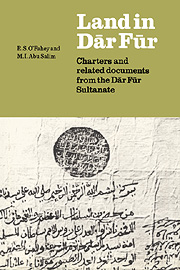Book contents
- Frontmatter
- Contents
- Preface and acknowledgements
- List and concordance of documents
- Transliteration and abbreviations
- Chapter 1 The Dār Fūr Sultanate
- Chapter 2 Estate and privilege
- Chapter 3 Literacy and Chancery
- Chapter 4 A Diplomatic Commentary
- Chapter 5 Translations and Commentary
- Sources and bibliography
- Notes
- Indices
Chapter 5 - Translations and Commentary
Document
Published online by Cambridge University Press: 16 November 2009
- Frontmatter
- Contents
- Preface and acknowledgements
- List and concordance of documents
- Transliteration and abbreviations
- Chapter 1 The Dār Fūr Sultanate
- Chapter 2 Estate and privilege
- Chapter 3 Literacy and Chancery
- Chapter 4 A Diplomatic Commentary
- Chapter 5 Translations and Commentary
- Sources and bibliography
- Notes
- Indices
Summary
The faqīh 'Abdallāh's charter
The first charter presented here eloquently describes one aspect of the relationship between the sultans and the fuqarā' the material rewards granted by the former in return for spiritual services by the latter. Here Sultan Muḥammad al-Ḥusayn issues a charter for the faqīh 'Abdallāh b. Abu'l-Hasan, confirming an earlier grant of land to the faqīh by Muḥammad al-Faḍl. The faqīh had been granted the land for teaching the sultan's sons the Qur'ān.
There is another example of such a grant; a faqīh Muḥammad of the Mīma people, a small Arabized tribe living to the south-east of al-Fāshir, taught the children of 'Abd al-Rahmān, who granted him an estate at Simayn near Wadā'a, the centre of the Mīma.
The charter's form differs markedly from others issued by the same sultan, but there is no reason to doubt its authenticity. Among the differences are the presence of an invocatio, a basmala and hamdala, where Muḥammad al-Ḥusayn's charters usually open directly with the intitulatio, min hadra…, and the generally humble tone of the intitulatio. Similarly, the religious feeling in the quotation from Muḥammad al-Faḍl's charter contrasts with the usual tone of his charters.
seal …
In the name of God, the Compassionate, the Merciful: praise be to God, and blessing and peace be upon the Messenger of God and his family, with peace.
Thereafter: says the lowly slave, who confesses his sin and shortcoming and seeks the forgiveness of his Lord, the Omnipotent; scion of the pious ones and offspring of the good [and] pure, the Commander of the Faithful and Sultan of the Muslims, Sultan Ḥusayn, son of the late Sultan Muḥammad al-Faḍl.
- Type
- Chapter
- Information
- Land in Dar FurCharters and Related Documents from the Dar Fur Sultanate, pp. 35 - 118Publisher: Cambridge University PressPrint publication year: 1983

